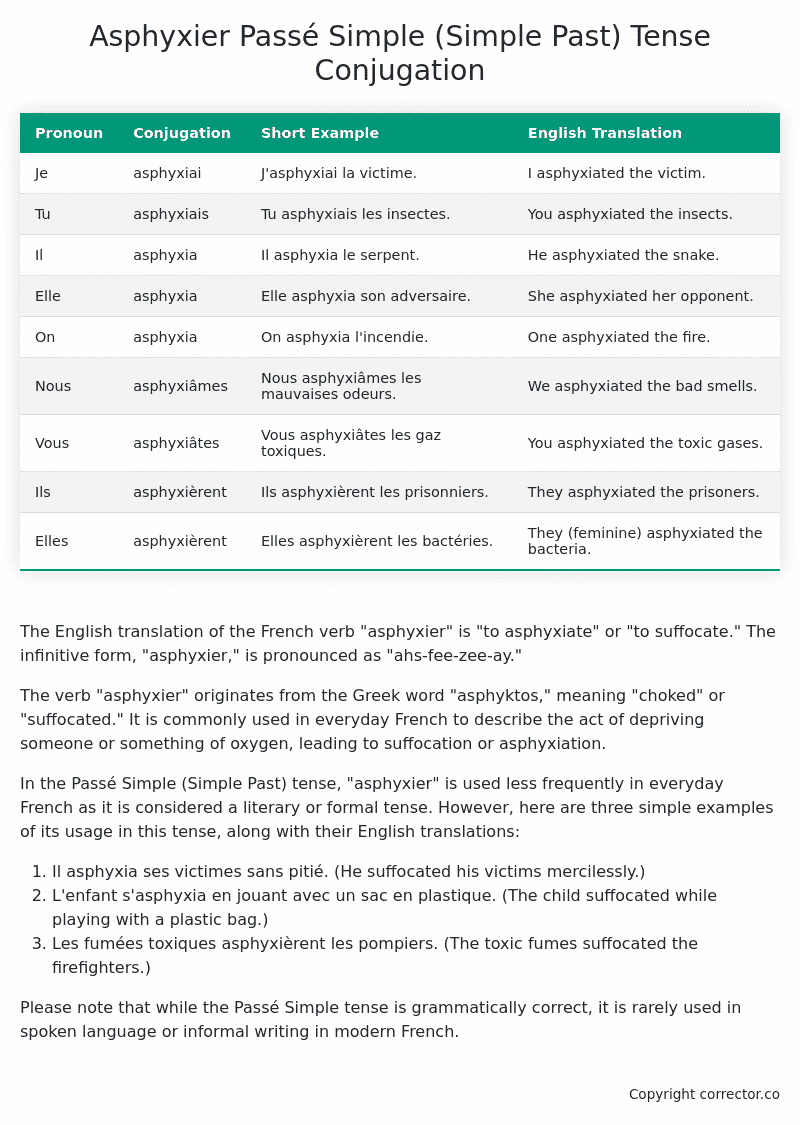Passé Simple (Simple Past) Tense Conjugation of the French Verb asphyxier
Introduction to the verb asphyxier
The English translation of the French verb “asphyxier” is “to asphyxiate” or “to suffocate.” The infinitive form, “asphyxier,” is pronounced as “ahs-fee-zee-ay.”
The verb “asphyxier” originates from the Greek word “asphyktos,” meaning “choked” or “suffocated.” It is commonly used in everyday French to describe the act of depriving someone or something of oxygen, leading to suffocation or asphyxiation.
In the Passé Simple (Simple Past) tense, “asphyxier” is used less frequently in everyday French as it is considered a literary or formal tense. However, here are three simple examples of its usage in this tense, along with their English translations:
- Il asphyxia ses victimes sans pitié. (He suffocated his victims mercilessly.)
- L’enfant s’asphyxia en jouant avec un sac en plastique. (The child suffocated while playing with a plastic bag.)
- Les fumées toxiques asphyxièrent les pompiers. (The toxic fumes suffocated the firefighters.)
Please note that while the Passé Simple tense is grammatically correct, it is rarely used in spoken language or informal writing in modern French.
Table of the Passé Simple (Simple Past) Tense Conjugation of asphyxier
| Pronoun | Conjugation | Short Example | English Translation |
|---|---|---|---|
| Je | asphyxiai | J’asphyxiai la victime. | I asphyxiated the victim. |
| Tu | asphyxiais | Tu asphyxiais les insectes. | You asphyxiated the insects. |
| Il | asphyxia | Il asphyxia le serpent. | He asphyxiated the snake. |
| Elle | asphyxia | Elle asphyxia son adversaire. | She asphyxiated her opponent. |
| On | asphyxia | On asphyxia l’incendie. | One asphyxiated the fire. |
| Nous | asphyxiâmes | Nous asphyxiâmes les mauvaises odeurs. | We asphyxiated the bad smells. |
| Vous | asphyxiâtes | Vous asphyxiâtes les gaz toxiques. | You asphyxiated the toxic gases. |
| Ils | asphyxièrent | Ils asphyxièrent les prisonniers. | They asphyxiated the prisoners. |
| Elles | asphyxièrent | Elles asphyxièrent les bactéries. | They (feminine) asphyxiated the bacteria. |
Other Conjugations for Asphyxier.
Le Present (Present Tense) Conjugation of the French Verb asphyxier
Imparfait (Imperfect) Tense Conjugation of the French Verb asphyxier
Passé Simple (Simple Past) Tense Conjugation of the French Verb asphyxier (You’re reading it right now!)
Passé Composé (Present Perfect) Tense Conjugation of the French Verb asphyxier
Futur Simple (Simple Future) Tense Conjugation of the French Verb asphyxier
Futur Proche (Near Future) Tense Conjugation of the French Verb asphyxier
Plus-que-parfait (Pluperfect) Tense Conjugation of the French Verb asphyxier
Passé Antérieur (Past Anterior) Tense Conjugation of the French Verb asphyxier
Futur Antérieur (Future Anterior) Tense Conjugation of the French Verb asphyxier
Subjonctif Présent (Subjunctive Present) Tense Conjugation of the French Verb asphyxier
Subjonctif Passé (Subjunctive Past) Tense Conjugation of the French Verb asphyxier
Subjonctif Imparfait (Subjunctive Imperfect) Tense Conjugation of the French Verb asphyxier
Subjonctif Plus-que-parfait (Subjunctive Pluperfect) Tense Conjugation of the French Verb asphyxier
Conditionnel Présent (Conditional Present) Tense Conjugation of the French Verb asphyxier
Conditionnel Passé (Conditional Past) Tense Conjugation of the French Verb asphyxier
Conditionnel Passé II (Conditional Past II) Tense Conjugation of the French Verb asphyxier
L’impératif Présent (Imperative Present) Tense Conjugation of the French Verb asphyxier
L’impératif Passé (Imperative Past) Tense Conjugation of the French Verb asphyxier
L’infinitif Présent (Infinitive Present) Tense Conjugation of the French Verb asphyxier
L’infinitif Passé (Infinitive Past) Tense Conjugation of the French Verb asphyxier
Le Participe Présent (Present Participle) Tense Conjugation of the French Verb asphyxier
Le Participe Passé (Past Participle) Tense Conjugation of the French Verb asphyxier
Struggling with French verbs or the language in general? Why not use our free French Grammar Checker – no registration required!
Get a FREE Download Study Sheet of this Conjugation 🔥
Simply right click the image below, click “save image” and get your free reference for the asphyxier Passé Simple tense conjugation!

Asphyxier – About the French Passé Simple (Simple Past) Tense
Formation
Usage
Narration
Historical Context
Interactions with other tenses
Passé Composé
Imparfait
Conditional and Subjunctive
Summary
I hope you enjoyed this article on the verb asphyxier. Still in a learning mood? Check out another TOTALLY random French verb conjugation!


